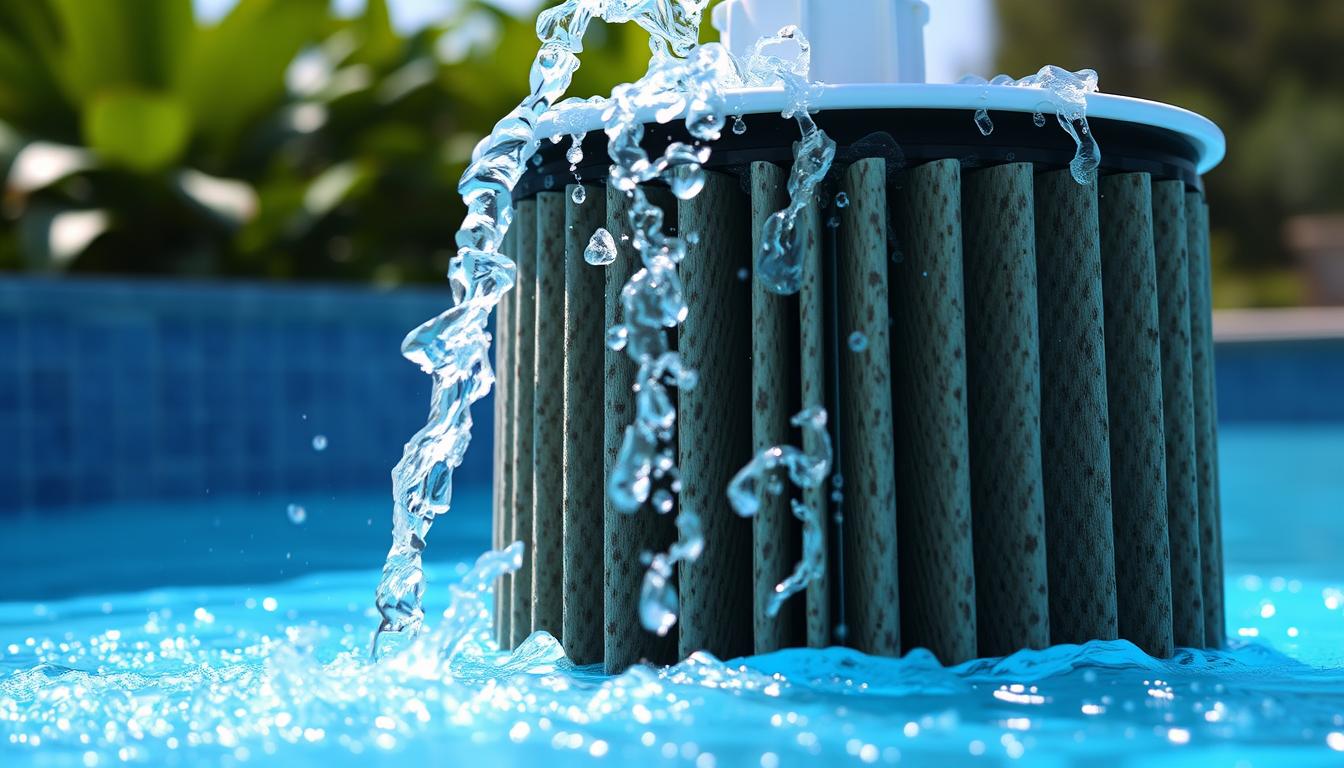
Crystal-clear pool water is every owner’s dream. Your pool filter works tirelessly to keep the water clean and hygienic. However, even advanced filters need regular maintenance.
The pool filter rinse is a crucial step in this process. It helps maintain your filter’s efficiency and extends its lifespan. Let’s explore what a pool filter rinse does and why it’s important.
Regular pool filter cleaning is vital for a healthy swimming environment. Clean your filter every 4-6 weeks during the active season. Reduced water flow or cloudy water can indicate a clogged filter needing attention.
Sand filters need backwashing when the pressure gauge rises by 7-10 psi. Rinse cartridge filters every two to four weeks and replace them yearly or bi-yearly. DE filters require annual teardown cleaning and backwashing when pressure rises 7-10 psi.
Neglecting filter maintenance can lead to poor water quality. It may also increase energy consumption and result in costly repairs. Regular care ensures your pool stays in top condition.
We’ll explore pool filter rinsing in detail. You’ll learn about the rinsing cycle and the benefits of regular maintenance. Get ready to discover the power of proper pool filter care!
Key Takeaways
- Pool filter rinsing is a crucial step in maintaining your filter’s efficiency and extending its lifespan.
- Regular pool filter cleaning, every 4-6 weeks during the active season, is essential for a healthy swimming environment.
- Sand filters require backwashing when the pressure gauge rises by 7 to 10 psi.
- Cartridge filters should be rinsed every two to four weeks and replaced annually or biannually.
- DE filters need a full teardown cleaning at least once a year and backwashing when the pressure gauge rises by 7 to 10 psi.
Understanding the Pool Filter Rinse Cycle
The pool filter rinse cycle is vital for a clean, well-functioning swimming pool. It removes leftover debris after backwashing, keeping your pool pristine. Understanding this process helps pool owners maintain top-notch water quality.
The Role of the Rinse Setting on Your Pool Filter
Pool filters have a multiport valve with settings like ‘Filter’, ‘Rinse’, and ‘Backwash’. The rinse setting is crucial for maintenance. After backwashing, set the valve to “rinse” and run the pump briefly.
This step settles the sand bed and clears remaining debris. It prevents dirty water from returning to your pool.
How the Rinse Cycle Differs from Backwashing
Backwashing and rinsing are distinct steps in pool filter cleaning. Backwashing reverses water flow to remove trapped dirt. It lasts until the sight glass water runs clear.
The rinse cycle is shorter. It flushes out loose contaminants and resets the filter media after backwashing.
| Pool Filter Maintenance Task | Frequency |
|---|---|
| Backwashing | Weekly during summer; after vacuuming |
| Rinsing | Immediately after backwashing |
| Sand replacement (sand filters) | Every 3-5 years |
| Filter replacement (cartridge filters) | Every 2-5 years |
Regular rinse cycles keep your filter working optimally. This results in cleaner, clearer pool water. Always turn off the pump before changing filter settings to prevent damage.
Benefits of Performing a Pool Filter Rinse
A pool filter rinse offers many perks for a cleaner, healthier swim. This key step keeps your pool in top shape all season long.
Removing Debris and Sediment from the Filter
A filter rinse removes leftover debris after backwashing. It flushes out remaining contaminants for a cleaner system. This process maintains filter efficiency and prevents clogs or damage.
Improving Filter Efficiency and Water Clarity
A thorough rinse boosts filter efficiency and water clarity. It allows the system to trap impurities better. This results in clearer, more inviting pool water for everyone to enjoy.
Extending the Life of Your Pool Filter
Regular rinsing can greatly extend your filter’s lifespan. It reduces strain on components by removing built-up debris. A clean filter works more efficiently, using less energy.
This process lowers the risk of breakdowns or malfunctions. By rinsing your filter, you can avoid costly repairs or replacements.
| Filter Type | Rinse Frequency | Benefits |
|---|---|---|
| Sand Filter | After each backwash | Settles sand bed, removes debris |
| Cartridge Filter | Every 2-4 weeks | Flushes out contaminants, improves efficiency |
| DE Filter | After recharging with DE powder | Removes excess DE, enhances filtration |
A pool filter rinse brings many benefits to your swimming experience. It removes debris, boosts efficiency, and extends filter life. This simple step greatly improves your pool water quality.
What Does Rinse Do on a Pool Filter?
Pool filter rinsing is crucial for maintaining a clean and efficient filtration system. It’s done after backwashing, which occurs every 1-4 weeks. The rinse cycle keeps your pool water clear and your filter working well.
Flushing Out Loose Contaminants After Backwashing
Backwashing pushes water through the filter backwards, dislodging trapped debris. However, some loose particles may remain in the filter media. The rinse cycle flushes out these remaining contaminants.
Run the pump for 1-2 minutes on the rinse setting. This high-rate water flow removes loose materials. It prevents debris from re-entering your pool and causing cloudiness.
Resettling the Filter Media for Optimal Performance
The rinse cycle also resettles the filter media, like sand or diatomaceous earth (DE). Backwashing can disturb these materials, spreading them unevenly. The rinse cycle’s high flow redistributes the media for better filtration.
Preventing Debris from Returning to the Pool
Rinsing after backwashing removes leftover debris before it reaches your pool. This keeps your water crystal-clear and reduces the need for extra cleaning. Regular backwashing and rinsing extend your filter’s life.
Different filters have varying lifespans: cartridge filters last 1-3 years, sand filters 5-7 years, and DE filters 10+ years. Proper maintenance ensures a cleaner, healthier swimming environment for you to enjoy.







